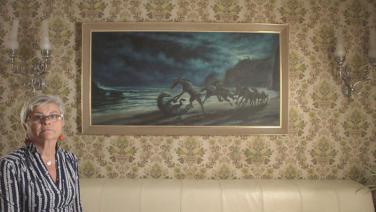
Twelve-part series that explores the changing production model by which the old tobacco factory became the current International Cultural Centre. Lurking two big questions: what do we need from the past when it comes to work? and how and from where one can speak of memory ?.
Tabakalera embodies these and many other issues, which has allocated a small space in the building, Storage, where the series is shown as a video installation, adding a chapter each mid-month, starting from the inauguration on September 11, until September 2016. The project by Cruza Marte, is accompanied by a public side events.
Chapter 6 - Notes on the first book by Mrs M
(kindly read by herself)
I find my writing a funny thing. Further than if I consider myself a writer or not, writing creates a harmless opposition in my navigational mind: I am introduced into very concrete emotions, but, nevertheless, they never overwhelm me. All my emotions gather in the intensity of the time I dedicate to writing. They are happy there. They are not fuel for the stories I tell; neither do I need them to burn.
I talk as if I were a professional, I who has only written ten novels and a million verses.
(That is what I told myself when I started writing: so that I would not lose hope, so that I would not get bored, so that my lack of experience would not come against me but help me, so that no first time would become a last time, so that I would just take pleasure in that stupid writing thing, which, I must admit, I had felt since I was a girl and had let it go, without paying attention to it, because it was a stupid thing, absurd, but at the same time, intimately important, until I realised that that type of stupid thing goes back to your past every chance it gets, leaving behind a vague sense of cowardice, which I ignore, hiding in the most stupid corner of the house).
Since I decided (...) and told myself very seriously, "it is enough", afternoons fall silently, and silence is not an open esplanade to pain, as I imagined it would be, for that is what it used to be, but a warm intimacy, similar to the warmth we feel when it is winter outside and we are inside, similar to that of looking out the window at a snowed and empty square, surrounded by dark buildings which are splashed with as many windows, orange lights veiled by thick curtains. If you try hard and listen, you listen nothing, nothing! But all of them, all of those voices are there, enjoying that moment of intimacy, common and particular at the same time.
As I was taken by such a silent intimacy, exclusive and inclusive, I decided to write, and to be more precise, to write about those years when my body was saluted as part of a group of workers. You must forgive me for talking about bodies and not people, you must forgive me and pay attention to the significance of this word, body, which is brutal, indeed, regarding that thing that is called identity or personality (or even character), that thing that distinguishes us from the masses, from the rest of extras, the way Emma Bovary and Nora Helmer where distinguished. Body is a brutal word, brutal and necessary to the same extent, for that is what we were, we were bodies and nothing else; since I have decided to write, I have decided not to fool myself, not to falsify things or propose a sort of Work Dulcineas. On the contrary, I want to find our dignity in the very same words that apparently undermine and beat us, I want to find in them the source of a resistance that happened, existed, a resistance which was not neither heroic nor miraculous, but intelligent and consubstantial, an active resistance that happened then and happens now, for we do not refuse what we have been: we have been bodies, beautiful bodies lubricating light in a hell that was not particularly worse that others.
As a writer, I am young like the morning haze, but my body, incredibly determined in front of paper and desk, is old, and aches. This pain is mine, it makes me sick, it accompanies me, it keeps me awake, it makes me remember, it possesses a knowledge that goes beyond what technique-lovers call "to know how" (it is, on the contrary, "how to know"). My body is part of a communal thing that shows I have done it, we have done it, and we did it... The work that incarnated, raised, lifted and build this body, my body, among others, was anonymous and seemingly trifle, and it is to the same extent inevitable to conclude the following: we are not victims of history, but incredible fighters. Let the usurpers of other people's pain carry the burden.
I do not want you to think that I am trying to hide the terrible injustices that thrived abundantly at the time; instead I want to rise upon them, from them, a voice that lives in the frozen desert, among others, under the wing of our weak illusions, so that it becomes clear: there was a we. There was, indeed. And that is why I write.
(Your eyes are poetry. And your hands hugging me, the first of many mornings, were friendship. We were, we are and we will be).
Sixth episode of the twelve-part series that explores the changing production model by which the old tobacco factory became the current International Cultural Centre
